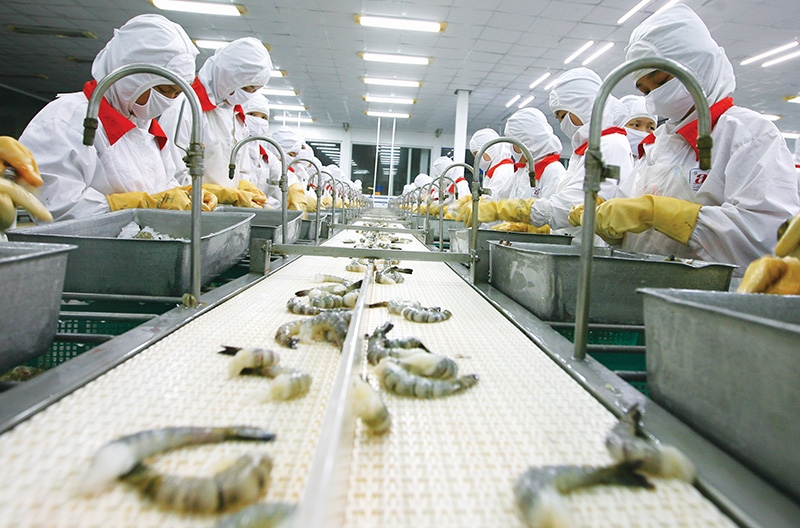Practical manoeuvres to glide over choppy waters
 |
| Vietnamese seafood processors are expected to be further fueled by the recent support package from the government Photo: Le Toan |
The global health emergency is hitting global growth, including ASEAN economies. The crisis is evolving to be not just a severe external shock including falling global demand, supply disruptions, and oil price shock, but also a severe domestic demand shock through curfews, quarantines, and social distancing. In response to the COVID-19 pandemic, Prime Minister Nguyen Xuan Phuc has issued Directive No.11/CT-TTg on urgent tasks and solutions to remove difficulties for businesses and workers.
Following the fresh move, Vietnam launched a VND30 trillion ($1.3 billion) fiscal stimulus package which focuses on liquidity measures and reducing business costs to help companies, especially small- and medium-sized enterprises (SMEs) facing severe disruptions. The package also boosts consumption through tax breaks and income support for affected workers and lower-wage households.
The State Bank of Vietnam (SBV) also stepped up its monetary policy response last week, announcing a 100-basis-point cut to its refinancing rate to 5 per cent from 6 per cent, while lowering the discount rate by 50bps from 4 to 3.5 per cent. The SBV also lowered the cap on VND deposit rates of less than six months to 4.75 from 5 per cent, and the cap on lending rates applied to loans made to priority sectors (for example agriculture, export-related industries, SMEs, and high-tech) from 6 to 5.5 per cent.
Phan Van Viet, chairman of Viet Thang Jean Co., Ltd. (VitaJean), said that it is positive news for businesses affected by the slowdown in activity from the crisis. As a local garment manufacturer, VitaJean expects the set of measures will provide relief to his business during the COVID-19 pandemic. However, he expected that the government develops more economic support measures for businesses to combat the crisis in the long term.
On the same note, Do Phuoc Tong, chairman of Ho Chi Minh City-based Duy Khanh Engineering Co., Ltd., said that he welcomed the economic support in the fight, including the deferral of tax payment and the lending rate cut. However, he has yet to study the measures in detail and how his businesses can benefit from the support in the coming time.
According to Hirai Shinji, chief representative of the Japan External Trade Organization’s (JETRO) Ho Chi Minh City Office, it is still early to evaluate the effect of each policy in detail, but so far the Vietnamese government has been working well on a very difficult issue. The country has managed to keep the spread of COVID-19 under control while maintaining economic development at the same time. Employees at Japanese businesses, including expatriates, basically feel safe and secure in Vietnam though they have to be very cautious.
Marko Walde, chief representative of the delegation of the German Industry and Commerce in Vietnam, told VIR that it is essential and helpful to implement these packages of measures to mitigate the impact of the coronavirus. It shows that the Vietnamese government has taken decisive and forceful action to curtail the impact of the crisis immediately.
“It is also important to make sure that all measures are practical and effective. For example, setting up a national steering committee with concrete contact points for businesses. These actions should be taken as fast as possible to counter the economic impact of the coronavirus, in order to bring the economy back onto a growth path as quickly as possible,” he said.
Walde added that it is essential that affected Vietnamese companies could easily access these financial and non-financial supports, which would definitely be very helpful for them to mitigate the outbreak.
Comprehensive support
The economists agree that Vietnam’s growth outlook in the near term is turning increasingly uncertain, but the country could be more resilient to the current shocks, such as COVID-19, oil price, and lockdowns, than other ASEAN countries. However, Vietnam may need additional fiscal support measures to further stimulate domestic demand.
Linda Liu, an economist at Maybank Kim Eng, told VIR that the announced fiscal stimulus package accounts for 0.5 per cent of GDP and is considerably smaller than past fiscal packages during the global financial crisis during 2008-2009 ($9 billion, or 8.8 per cent of GDP), as well as in 2012 (0.9 per cent) and 2013 (0.8 per cent).
The stimulus is also proprtionately smaller than those issued by most other ASEAN countries. For example, Singapore has allocated up to S$6.4 billion ($4.6 billion) or 1.2 per cent of GDP in its first fiscal support package announced during the budget in 2020, and is now looking to prepare a larger second round of support measures.
Liu added that Vietnam’s public debt has come off from the peak of 64 per cent in 2016 to an estimated 56 per cent of GDP by 2019. Lower public debt pressures would help to create fiscal room for greater government support measures. Increasing expenditure, or possibly bringing forward spending for priority infrastructure and social spending projects, previously allocated for later years, would be beneficial for Vietnam’s growth in the longer term.
“In terms of monetary policy, the SBV’s rate cut move on March 17 may have limited effect on boosting credit growth in the near term. The demand for new loans is likely to continue to remain weak on the back of dampened business and consumer sentiments given growing uncertainty over the outbreak,” she said.
Preparing for uncertainty
While the COVID-19 pandemic continues to be unpredictable and increasingly widespread, Vietnam has responded well from the very outset, preventing its spread.
Walde noted that it is now the ideal time to conduct a health check on business to assess potential risks and impacts. They should update and consider any potential changes in the current situation and be prepared in the event the situation worsens, regarding to the new stable supply chain, the new potential markets and partners.
“Currently in Vietnam, given the school closures, employers need to be much more flexible for staff with children. That’s the reason why the Vietnamese government should enable employees to work from home and/or encourage companies to consider remote working solutions for staff by adapting the labour regulations to suit the current needs,” Walde said.
“There are many cloud-based software programmes to enable people to be flexible, and we advise that companies consider their own systems and implement software as necessary. In addition, this will help maintain good labour-management relations and reduce the risk of the spread of novel coronavirus in the community,” he added.
Meanwhile, Jetro’s Shinji likened the situation to being on a ship hit by a very strong storm. Urgent measures such as restriction of immigration are understandable, but it is very difficult to tell how long the government needs to continue such measures.
“The Vietnamese government has paid great attention to and kept an open ear to the voice of Japanese companies in Vietnam so far,” Shinji said. “I hope the Vietnamese government and Japanese companies will keep communicating well, with full support from the Japanese Embassy, the Japanese Chamber of Commerce and Industry, and the JETRO.”
| Matthew Lourey - Managing partner Domicile Corporate Services
The impact of COVID-19 on global business is unprecedented, and foreign businesses in Vietnam are facing the same challenges as those impacting local businesses. With no visibility for when the effects of the pandemic will start to subside, there is considerable uncertainty across the board. The recent announcement from the Vietnamese prime minister providing economic support for businesses in Vietnam serves as an initial boost, allowing the preservation of cash flow from deferred tax payments and giving some sense of relief to stressed business leaders. Foreign businesses in Vietnam are under pressure and are trying to sustain business operations – certain sectors are facing significantly more challenges than others. The challenge for many is to protect employees and business structure, so that when the current crisis starts to turn, they can actually take advantage of opportunities. From a foreign business perspective, there is still a positive medium-term outlook for Vietnam, and sustaining the business for the medium term opportunities will likely require further government short-term support in Vietnam for all businesses, particularly if the pandemic impact is sustained and not brought under control. Two important things are at the front of mind at the moment. First, government agencies being proactive and supportive of businesses, such as in the decision this week to suspend accepting work permit applications or renewals for foreign experts and managers, provides unnecessary uncertainty to foreign employers. Second, ensuring that employees are given support and protection, allowing them to feel protected and cared for. Policies allowing flexibility in working locations and times, and without risk or fear of losing their jobs, will pay off in the long run, but done the wrong way, will result in instability that businesses cannot afford at this time. John Fering - Managing director Cargill Animal Nutrition Thailand and Vietnam
The global pandemic is affecting all aspects of life and, obviously, Cargill is not outside of its scope of impact. At Cargill, our top priorities now are keeping our people safe and keeping our business continuity. We are prioritising the health and safety of our employees. This includes adopting additional precautions to support staff at production facilities, including temperature screening, cleaning and sanitising procedures, prohibiting visitors from our facilities, banning international and limiting domestic travel, adopting social distancing practices where possible, offering work-from-home option to office staff, and shift flexibility to keep our major production facilities open. When it comes to business, Cargill is doing everything reasonably possible, to minimise business disruptions. As we provide essential ingredients, feed and food that nourish people and animals, we are taking this responsibility very seriously and strive to keep our operations – and our customer businesses – running. Fortunately, disruption in our global supply chain and operation has been limited. Yet, we do not overlook the situation, we have contingency plans to minimise the impact in case there is any disruption of the global supply chain due to COVID-19 escalation. While it is highly contagious and unpredictable, the Vietnamese government and health authorities at all levels have done a great job in medical treatment and keeping the disease from mass spreading. Cargill highly appreciates all the efforts made by the government and Vietnamese people, from running large-scale quarantine facilities, medical care to the infected cases, to mass communication, to keep people aware, and to protect communities. Our hats are off to the silent sacrifice of the local health squads, especially the frontline medical officials who have been working day and night to keep the nation staying strong. Yun Liu - Economist, HSBC Vietnam
Given limited fiscal space, we expected the State Bank of Vietnam (SBV) to be tasked with supporting growth. That said, rate cuts came earlier than expected, with a larger magnitude of 100 basis points compared to our forecast of 25 basis points. This largely reflects the SBV’s growing concerns about COVID-19 to the economy. With the rate cuts, the SBV is aiming to ease financial burdens and spur business investment via the credit channel. According to the central bank, credit growth slowed significantly in the first two months of the year, as capital demands were lowered by the uncertainties caused by COVID-19. It is worth noting that the SBV is also implementing some targeted measures, including ordering commercial banks to exempt, reduce, delay, and restructure interest rates for virus-hit sectors. As such, the rate cut decision will complement previous easing measures and likely support the broad-based economy amidst looming risks. We expect the SBV to stay put for the remainder of the year. That said, if global economic and financial conditions were to deteriorate even further, a further 50bps cut in the second quarter cannot be ruled out, but that’s not our base case for now. |
What the stars mean:
★ Poor ★ ★ Promising ★★★ Good ★★★★ Very good ★★★★★ Exceptional
Themes: Safe and Sound Vietnam
Related Contents
Latest News
More News
- Foreign leaders extend congratulations to Party General Secretary To Lam (January 25, 2026 | 10:01)
- 14th National Party Congress wraps up with success (January 25, 2026 | 09:49)
- Congratulations from VFF Central Committee's int’l partners to 14th National Party Congress (January 25, 2026 | 09:46)
- 14th Party Central Committee unanimously elects To Lam as General Secretary (January 23, 2026 | 16:22)
- Worldwide congratulations underscore confidence in Vietnam’s 14th Party Congress (January 23, 2026 | 09:02)
- Political parties, organisations, int’l friends send congratulations to 14th National Party Congress (January 22, 2026 | 09:33)
- Press release on second working day of 14th National Party Congress (January 22, 2026 | 09:19)
- 14th National Party Congress: Japanese media highlight Vietnam’s growth targets (January 21, 2026 | 09:46)
- 14th National Party Congress: Driving force for Vietnam to continue renewal, innovation, breakthroughs (January 21, 2026 | 09:42)
- Vietnam remains spiritual support for progressive forces: Colombian party leader (January 21, 2026 | 08:00)




 Tag:
Tag:

















 Mobile Version
Mobile Version